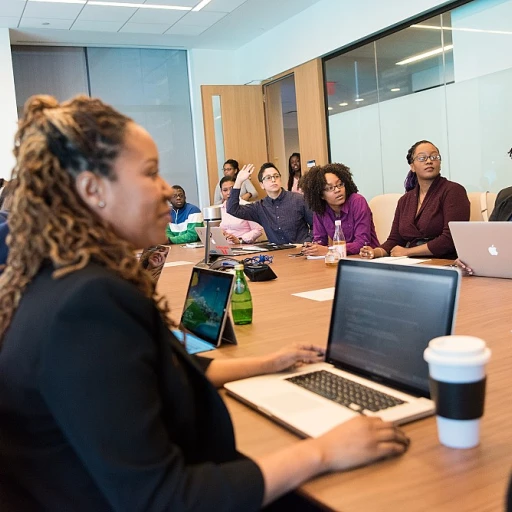
Understanding the Role of a Chief Human Resources Officer
The Crucial Role of HR Leadership in Organizational Change
In today's rapidly evolving business landscape, the role of a Chief Human Resources Officer (CHRO) is both dynamic and essential. As organizations navigate through constant changes, HR leaders are increasingly taking center stage in steering these transitions effectively. A CHRO holds a pivotal position, intertwining human resources strategies with overarching business objectives. This alignment ensures that the workforce adapts seamlessly to change while also fostering a culture that embraces transformation.
A CHRO not only manages traditional HR functions but also takes on a strategic role in organizational change. By guiding change initiatives, these professionals shape and implement strategies that align with the organizational goals. The responsibility involves being a key player in project management, acting as a change manager who ensures that all levels of the organization are engaged and equipped to handle changes adeptly.
This role is multifaceted, encompassing tasks from evaluating the effectiveness of current HR practices to initiating new approaches that support the organization's adaptive needs. The CHRO must possess superior problem-solving skills, enabling them to address challenges that may arise during the transformational phases. Their expertise in managing both people and processes is crucial for driving successful outcomes in any change management project.
At the core, a CHRO requires a blend of skills — from being an agile leader who can swiftly respond to evolving business needs to a management specialist who can orchestrate and implement changes with precision. Their level of involvement in organizational change is deeply rooted in their experience and ability to influence others positively. For those navigating this career path, understanding how to effectively manage these responsibilities will be crucial in paving the way toward senior management roles.
For more insights on the critical function and strategies employed by CHROs during transitions, consider exploring insights from a popular resource on managing transitions, which offers valuable perspectives on the subject.
The Importance of Change Management in HR
Change Management as a Crucial Element
In today's fast-paced business environment, the ability to adeptly manage change has become an indispensable quality for organizations aiming to maintain a competitive edge. Within this context, the chief human resources officer (CHRO) plays a pivotal role in spearheading change management initiatives. They are often tasked with overseeing and implementing strategies that address organizational change, ensuring a smooth transition for both employees and the business. Change management within HR encompasses several facets, from project management to leadership development. A CHRO's role includes aligning these changes with the company's overall mission, effectively communicating across departments, and fostering a culture that embraces innovation. The integration of agile methodologies is another aspect that positions change management as a vital component of the HR function. As companies look to become more responsive to market demands, agile practices help streamline processes and enhance collaboration across teams. For those considering a career in HR leadership with a focus on change management, understanding its importance can be critical to your success. This understanding helps navigate the complexities and fosters an environment where change is seen not as a disruption, but as a path to improvement. For more insights on how change management is intricately linked to the role of a CHRO, visit Navigating Change: The Role of a Chief Human Resources Officer.Key Skills for Effective Change Management
Essential Skills for Driving Change
When looking to excel in the field of change management within HR leadership, certain skills are paramount. A chief human resources officer (CHRO) often plays a vital role in facilitating organizational change and ensuring smooth transitions. Here, we delve into some of the key skills professionals need to master for effective change management.- Communication and Interpersonal Skills: An effective change manager must have exceptional communication skills to articulate change initiatives to all levels of the organization. This involves being able to convey complex ideas clearly and persuasively.
- Leadership and Influence: Successful change management requires strong leadership. A professional must be able to inspire and guide teams through transitions, leveraging influence to win support for new processes.
- Strategic Thinking: Strategic thinking skills allow a CHRO to foresee potential challenges and opportunities, crafting a roadmap that aligns with the organization’s long-term objectives.
- Problem-Solving: Change often comes with unforeseen challenges. Skills in problem-solving are crucial for addressing issues promptly and efficiently, keeping projects on track.
- Agility and Flexibility: In a fast-paced business environment, adaptability is key. Professionals must be prepared to pivot strategies as necessary and remain open to innovative solutions.
- Experience with Project Management: Understanding the framework and methodologies of project management aids in planning, executing, and monitoring change efforts successfully.
Navigating Challenges in Change Management
Addressing the Complex Dynamics of Change Initiatives
In the ever-evolving world of business, navigating challenges in change management is a critical aspect of a Chief Human Resources Officer's role. Change managers often find themselves at the intersection of project management and organizational strategy, ensuring that businesses adapt smoothly to new directives. This journey is not without its hurdles, requiring a high level of professional acumen and problem-solving skills. Implementing change initiatives can be fraught with resistance from within the organization. Employees may be apprehensive about shifts in their work environment, job roles, or expectations. Here, a change manager must possess exceptional communication skills to articulate the benefits of these changes clearly and persuasively. Developing trust and transparency is key to overcoming resistance and fostering acceptance across all levels of the organization. Moreover, the agile nature of today's business environment demands flexibility and a readiness to pivot strategies when necessary. Management specialists often encounter unforeseen obstacles, from budget constraints to varying levels of employee engagement. Addressing these challenges requires strong leadership and an ability to adapt project management approaches in real-time. It's also important to consider the external pressures impacting change management. Economic volatility, technological advancements, and shifting market demands necessitate managers to stay informed and prepared to guide their organizations through external disruptions effectively. Building a robust network of change management professionals and consultants can provide invaluable insights and support during these times. In summary, the path of a change manager is filled with both challenges and opportunities for growth. By honing the necessary skills and remaining adaptable, those in HR leadership positions can successfully lead their organizations through even the most complex change initiatives, ultimately fostering a resilient and forward-thinking business culture.Career Opportunities in Change Management for HR Leaders
Opportunities for HR Leaders in Change Management
Embarking on a career path in change management offers HR leaders a multitude of opportunities to make a significant impact within organizations. As businesses continue to evolve, the role of a Chief Human Resources Officer (CHRO) in managing change is becoming increasingly crucial. This section explores the diverse career opportunities available for HR leaders who specialize in change management.
Expanding Roles in Organizational Change
As a CHRO, you can play a pivotal role in steering organizational change initiatives. This involves working closely with senior management to align change strategies with business goals. Change managers are essential in ensuring that transitions are smooth and that employees are engaged and supportive of new directions.
- Change Management Specialist: Focus on developing and implementing change strategies that enhance organizational effectiveness.
- Management Consultant: Offer expertise to guide businesses through complex change processes, providing insights and solutions tailored to specific challenges.
- Project Manager: Oversee projects that drive change, ensuring that objectives are met on time and within budget.
Enhancing Leadership and Problem-Solving Skills
HR leaders involved in change management can refine their leadership skills by managing diverse teams and navigating complex organizational dynamics. Effective change managers possess strong problem-solving abilities, which are essential in addressing resistance and facilitating successful change initiatives.
Career Advancement and Professional Growth
With the growing demand for skilled change managers, HR professionals can expect lucrative career prospects. Salaries for those specializing in change management are competitive, reflecting the high level of expertise required. Additionally, the experience gained in managing change can open doors to senior-level positions within the organization.
In conclusion, a career in change management within HR leadership not only offers diverse job opportunities but also provides a platform for professional growth and development. As organizations continue to adapt to new challenges, the role of HR leaders in facilitating change will remain indispensable.
Future Trends in Change Management and HR Leadership
Emerging Trends in HR and Change Management
The landscape of human resources and change management is continuously evolving. For those in HR leadership roles, particularly as a Chief Human Resources Officer (CHRO), staying ahead of these trends is crucial. As businesses become more agile, the demand for HR leaders who can effectively manage organizational change is increasing.
Agile and Flexible Work Environments
One of the most significant trends is the shift towards agile work environments. Companies are increasingly adopting agile methodologies not only in project management but also in their overall business operations. This shift requires change managers to be adept at fostering a flexible work culture, where adaptability and quick decision-making are key. As a result, HR leaders must cultivate skills in agile management to support these transformations.
Technology Integration and Digital Transformation
Technology continues to play a pivotal role in change management. The integration of digital tools in HR processes is not just about efficiency but also about enhancing employee experience. Change managers are expected to lead digital transformation initiatives, ensuring that technology adoption aligns with organizational goals. Professionals with experience in managing tech-driven change will find themselves at a distinct advantage in their careers.
Focus on Employee Experience and Well-being
Another emerging trend is the emphasis on employee experience and well-being. As organizations recognize the impact of employee satisfaction on productivity and retention, HR leaders are tasked with implementing change initiatives that prioritize well-being. This involves creating a supportive work environment and offering programs that address mental health and work-life balance.
Data-Driven Decision Making
Data analytics is becoming an indispensable tool for HR leaders. By leveraging data, change managers can make informed decisions that drive successful change initiatives. This trend underscores the importance of developing analytical skills and understanding how to interpret data to guide strategic planning and execution.
Leadership Development and Succession Planning
Finally, there is a growing focus on leadership development and succession planning. As the workforce evolves, so too must the leadership strategies. HR leaders are increasingly responsible for identifying and nurturing future leaders within the organization, ensuring a seamless transition during leadership changes.
In conclusion, staying informed about these trends is essential for HR leaders aiming to excel in their careers. By embracing change and developing the necessary skills, CHROs can effectively lead their organizations through the complexities of modern business environments.













